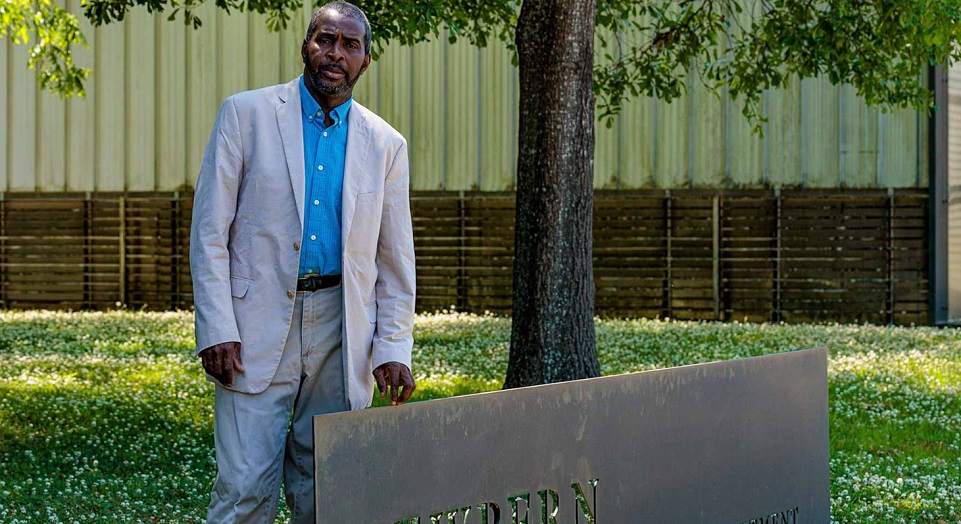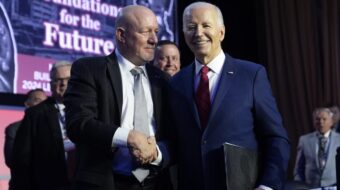
Newbern’s history is deeply rooted in slavery. Incorporated in 1854 as demand for land to produce cotton soared, the town of Newbern quickly developed into an economy dominated by labor camps where enslaved Black people were forced to grow cotton.
Cotton produced by enslaved people was Alabama’s cash crop since it became a state in 1819, and before long the state’s largest cotton plantations grew up out of the dark, rich soil of the Black Belt region.
Black residents, white officials
After the Civil War, emancipated Black people put aside their enslavement and embraced education, hard work, faith, and citizenship with extraordinary enthusiasm and devotion. By 1868, over 80% of Black men who were eligible to vote had registered, schools for Black children became a priority, and courageous Black leaders overcame enormous obstacles to win elections to public office.
But in response to Black citizens’ political organizing and exercising basic rights, white mobs targeted Black leaders and political officials, as well as Black community members who worked to encourage Black political engagement.
EJI’s Reconstruction in America report documents dozens of massacres against Black people, including in New Orleans and Eufaula, Alabama, in 1868 and Vicksburg, Mississippi, in 1874. In 1898, after former Confederates in Wilmington, North Carolina, lost governing power to an interracial political coalition, they successfully carried out an insurrection against the duly elected government and murdered as many as 100 Black people.
In Newbern, where 85% of the town’s 275 residents are Black, white leaders have held on to political control by avoiding elections altogether for at least six decades.
Born and raised in Newbern, 83-year-old Hattie Hollis could not recall a single election being held. “Not that I know of,” she told Tread’s Lee Hedgepeth. “I can’t remember any election.”
Instead, as Haywood Stokes III acknowledged in a court filing, “[t]he title of Mayor has simply been passed from individual to individual to anyone who would agree to be Mayor without regard to elections.” Mr. Stokes—a white man whose ancestor Peter P. Stokes enslaved at least five Black people—became the town’s mayor “in this manner” in 2008 when he inherited the position from Haywood Stokes Jr.
Janice Quarles, Barbara Patrick, James Ballard, and the Rev. James Williams—all Newbern residents over 70—told Capital B they recalled only two other former mayors besides Stokes: Robert Walthall, who served as mayor for 44 years, and Paul Owens, who served on the town council for 33 years and as mayor for 11 years.
Like Ms. Hollis, they said there had been no elections in Newbern for as long as they could remember.
In 2020, Newbern resident, contractor, and volunteer firefighter Patrick Braxton decided to run for mayor. He was fed up with officials’ indifference to the community’s needs—especially the majority-white council’s failure to provide disinfectant, masks, and other critical supplies to at-risk residents during the Covid-19 pandemic, he told Capital B.
Many residents of the tiny town—where nearly 30% of residents live below the poverty level—share that frustration, Capital B reported. Newbern received $30,000 under the American Rescue Plan Act, according to an estimate from U.S. Rep. Terri Sewell, but residents told Capital B they can’t see where the money has gone.
When Mr. Braxton told the incumbent mayor he intended to run for his seat, Mr. Stokes told him, “We’ve never had an election out here.” As Mr. Braxton told Tread, Mr. Stokes said, “We don’t have ballots and machines to do it.”
So Mr. Braxton called the Alabama Conference of Black Mayors, which told him how and where to file the necessary qualifying paperwork, he said in his lawsuit. He followed their instructions, and because no one else—including Mr. Stokes—filed the paperwork to qualify for the office, Mr. Braxton became Newbern’s first mayor on July 22, 2020.
No one had filed to run for town council, either. As provided by Alabama law, Mayor-Elect Braxton filled the vacancies by appointing James Ballard, Barbara Patrick, Janice Quarles, and Wanda Scott—the first majority-Black council in Newbern’s history.
In August, the suit alleges, Mr. Stokes and his former council members met in secret and passed an ordinance to hold a special election on October 6, but did not notify residents about the election. Indeed, Tread did not find anyone in the one-square-mile town who knew about it.
After no one else qualified for the October 6 election, the former council members—three white people (Gary Broussard, Jesse Leverett, Willie Tucker) and one Black person (Voncille Brown Thomas)—reappointed themselves as the town council.
Mr. Braxton and his council members were sworn into office and filed an oath of office with the county probate judge’s office on November 2, Capital B reported.
But, the codefendants claim in court filings, Mr. Braxton “lost the mayorship by operation of law” because he refused to attend meetings of the former council members, who then appointed Mr. Stokes to replace him as mayor.
Ten days after Mr. Braxton was sworn in, the city attorney’s office executed an oath of office for Mr. Stokes and his council.
Locked out of City Hall
Mr. Braxton alleges in his suit that Mr. Stokes locked him out of Town Hall, and but for a few boxes Mr. Braxton managed to recover, all official town records allegedly were removed or destroyed.
The People’s Bank of Greensboro and the city clerk barred Mr. Braxton from accessing the town’s financial records and bank accounts, and the post office refused to give him the town’s mail. The bank and post office are defendants in Mr. Braxton’s lawsuit.
Capital B reports that Mr. Braxton has been targeted for other harassment—drones have followed him to his home and a white man almost ran him off the road—and his white colleagues in the volunteer fire department have failed to back him up during emergencies involving Black residents.
And when LaQuenna Lewis began helping Mr. Braxton, the founder of Selma nonprofit Love Is What Love Does received handwritten threats with swastikas and racial epithets. “One of the letters had a drawing of her and Braxton being lynched,” Capital B reports.
But, like the many formerly enslaved Black people in the Newbern area who exercised their freedom by recording their surname as Braxton in the first census after the Civil War, Mr. Braxton says he’s not giving up his right to political participation even when threatened with violence.
While his federal lawsuit works its way through the courts, Mr. Braxton is running for mayor again in 2025.
We hope you appreciated this article. At People’s World, we believe news and information should be free and accessible to all, but we need your help. Our journalism is free of corporate influence and paywalls because we are totally reader-supported. Only you, our readers and supporters, make this possible. If you enjoy reading People’s World and the stories we bring you, please support our work by donating or becoming a monthly sustainer today. Thank you!












Comments